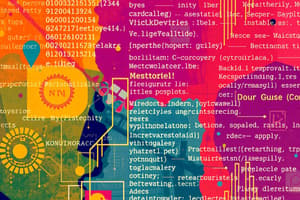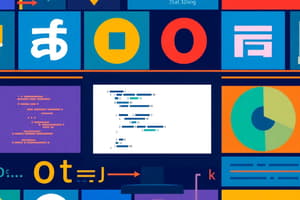Podcast
Questions and Answers
What is computer programming?
What is computer programming?
The process of instructing the computer to perform tasks or follow a series of commands.
Which of the following is not a way of programming?
Which of the following is not a way of programming?
- Creating computer programs
- Using an interface
- Using a calculator (correct)
- Typing commands
What is system software?
What is system software?
A type of computer program designed to make the computer functional and operational.
Which of the following is an example of application software?
Which of the following is an example of application software?
What is a computer programmer?
What is a computer programmer?
What type of languages are COBOL and Visual BASIC?
What type of languages are COBOL and Visual BASIC?
Machine language uses patterns of 0 and 1 to represent instructions.
Machine language uses patterns of 0 and 1 to represent instructions.
What does debugging involve?
What does debugging involve?
A __________ is a person who can design, create, and maintain computer programs.
A __________ is a person who can design, create, and maintain computer programs.
Match the following types of programming languages with their descriptions:
Match the following types of programming languages with their descriptions:
Flashcards are hidden until you start studying
Study Notes
What is Computer Programming?
- Involves instructing a computer to perform tasks through a series of commands.
- A computer is an electronic device designed to accept and manipulate data to produce information.
- Programming methods include typing commands, creating programs, using pre-existing software, and employing user interfaces like menus or GUIs.
Types of Software
- System Software: Essential for the computer's functionality, operating efficiently, and serving as an interface with application programs. Examples include:
- Operating systems
- Compilers and interpreters
- Device drivers
- Diagnostic programs
- Application Software: Designed to address specific problems or user needs. Examples include:
- Microsoft Office
- Web browsers
- Media players
- Database management systems
- Business software for inventory, payroll, etc.
The Computer Programmer
- A specialist in creating and maintaining computer programs.
- Types of Programmers:
- System Programmers: Develop system-level software and are proficient in low-level languages (e.g., Assembly, C, Java).
- Application Programmers: Focus on user-centric software using high-level, scripting, or fourth-generation languages.
Qualifications to be a Computer Programmer
- Must possess problem-solving skills, analytical thinking, organizational abilities, patience, resourcefulness, and a degree of obsessive attention to detail.
Levels of Programming Languages
- High-level Languages: User-friendly, with English-like commands (e.g., COBOL, Visual BASIC, HTML).
- Middle-level Languages: Combine high-level simplicity with low-level control (e.g., C++).
- Symbolic Languages: Use mnemonic codes for instructions (e.g., Assembly language).
- Machine Language: Comprised of binary code (0s and 1s) understandable primarily by computers.
Definition of Terms
- Bug: A term for errors in a program.
- Debug: Process of eliminating errors.
- Debugging: The act of identifying and removing bugs.
- Software: General term for computer programs.
- Hardware: Refers to the physical components of a computer system.
- Computer Program: A set of instructions for the computer.
- Computer Programming: Designing and creating computer programs.
- Programming Language: Tools for translating human instructions into machine-readable code.
- Programmer: A professional who creates and maintains programs.
- Algorithm: A step-by-step solution to a specific problem.
Studying That Suits You
Use AI to generate personalized quizzes and flashcards to suit your learning preferences.




